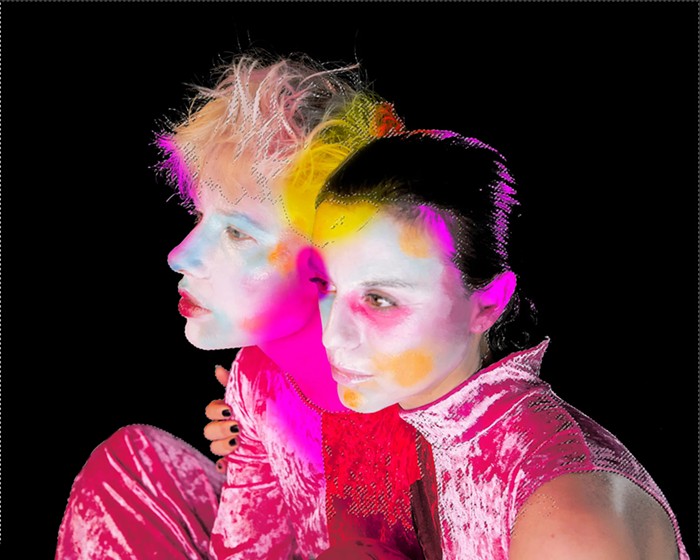
January is traditionally a miserable month for live music—among other things, as your therapist well knows. Dismal weather and post-holiday malaise make waking up and going out at night a Herculean endeavor. So to throw a festival as ambitious as Corridor in Georgetown’s spacious Equinox Studios during the dread days of winter stands as either foolish or brave.
I’m leaning toward the latter, as Corridor's musical lineup is loaded with adventurous artists such as sublime Vancouver drone composer Sarah Davachi, Seattle abstract-electronic genius Raica, master of unsettling ambience Rene Hell, audio surrealist Decimus, Oakland technoise renegade Black Hat, slow-pulse electro-crooner DJAO, the choral group the Esoterics, and others. Beyond the stellar music bill, Corridor’s organizers—Kirsten Thom and Matty McBride of the estimable Elevator crew, Ceci Corsano-Leopizzi (Decibel Festival marketing director), Gabriel Schubiner, Kellye Lynn Kuh, and Campbell Thibo—have brought in visual artists and dancers to create, if all goes according to plan, a synergistic environment that will keep you optimally stimulated with their “sound, light, and movement.” After the jump, I interview all five curators—who answered collectively—about Corridor’s origins and ethos and include an embed of Davachi’s latest magnum opus, Qualities of Bodies Permanent.
The Stranger: Whose idea was Corridor and what was the impetus to create it? It’s pretty rare to have such an ambitious event in one of the deadest times of the year for entertainment.
Corsano-Leopizzi: The time of year certainly inspired us. Matty and Kirsten had considered presenting a day-long festival for some time. At the beginning of summer this year, Matty approached Campbell Thibo about coordinating a dance element and helping with general vision. We were all interested in experimenting with the Elevator aesthetic through a longer-form, more immersive event. We needed to find a space, set a time, all of it. When an October date seemed to be approaching too quickly, the group refocused on January, when we also knew we'd have fewer conflicting festivals and a seasonal aesthetic that made sense thematically. Campbell suggested the name Corridor as a description of space that lies between claims, and connects them. We wanted to embrace winter, welcome darkness, and enjoy the indoors.
What criteria guided your choices of musicians, visual artists, and dancers for Corridor? Is there a common element you were looking for in each performer?
Our criterion for Corridor, and for Elevator as a whole, is pretty simple: To book artists whose work we find inspiring. For Corridor, we've expanded the core Elevator team to include dancers and visual artists, which allowed us to discover new artists and broaden our vision. The common element among these artists is that their work represents sincere expression, rather than trying to fit into an existing style.
For dance, Campbell needed makers who worked in-between or outside of styles. Many of the sound and visual artists perform with a reverent deconstruction of their chosen form, and we looked for a corollary in movement. Belle Wolf is one of the most versatile artists in Seattle, a graduate cum laude from Cornish, yet also emotionally moving in improvisation. Coleman [Pester] melds movement with architecture and form and is an inveterate collaborator.
Please discuss the qualities of the McKinnon building at Equinox Studios that made you want to choose it as Corridor’s venue.
The McKinnon building (named after Debbie McKinnon, previous owner) is a post-WWII cement pour in Georgetown that lived for years as a hardwood furniture manufacturing plant. It is massive, and, if construction runs according to schedule, it will include an enormous space running through its center by January. This passageway alone can hold hundreds of people once finished. We were taken with the McKinnon building right when we stepped in and quickly proposed the idea to Sam Farrazaino, the founder and developer of Equinox Studios. The McKinnon’s unfinished qualities make it a raw playground for the Corridor experience. We’re really excited to have this uniquely large space to work with, and see the Equinox environment as an integral part of the performance—combining the elements of dreary winter with industry, art, and vastness. Being in Georgetown was also a draw for us for these same reasons.
Is this going to be a one-off or are there plans for future Corridors?
Well, that’s partially a question of how the festival turns out this year, since it’s a pretty large endeavor for us. For now we are focused on creating a well-crafted experience for this year’s festival and engaging the community here and now. We’d love to do it next year as well, but we also have plenty on the horizon for Elevator as an event series and a label.
Corridor happens Saturday, January 23, 1 pm-10 pm, all ages.



















